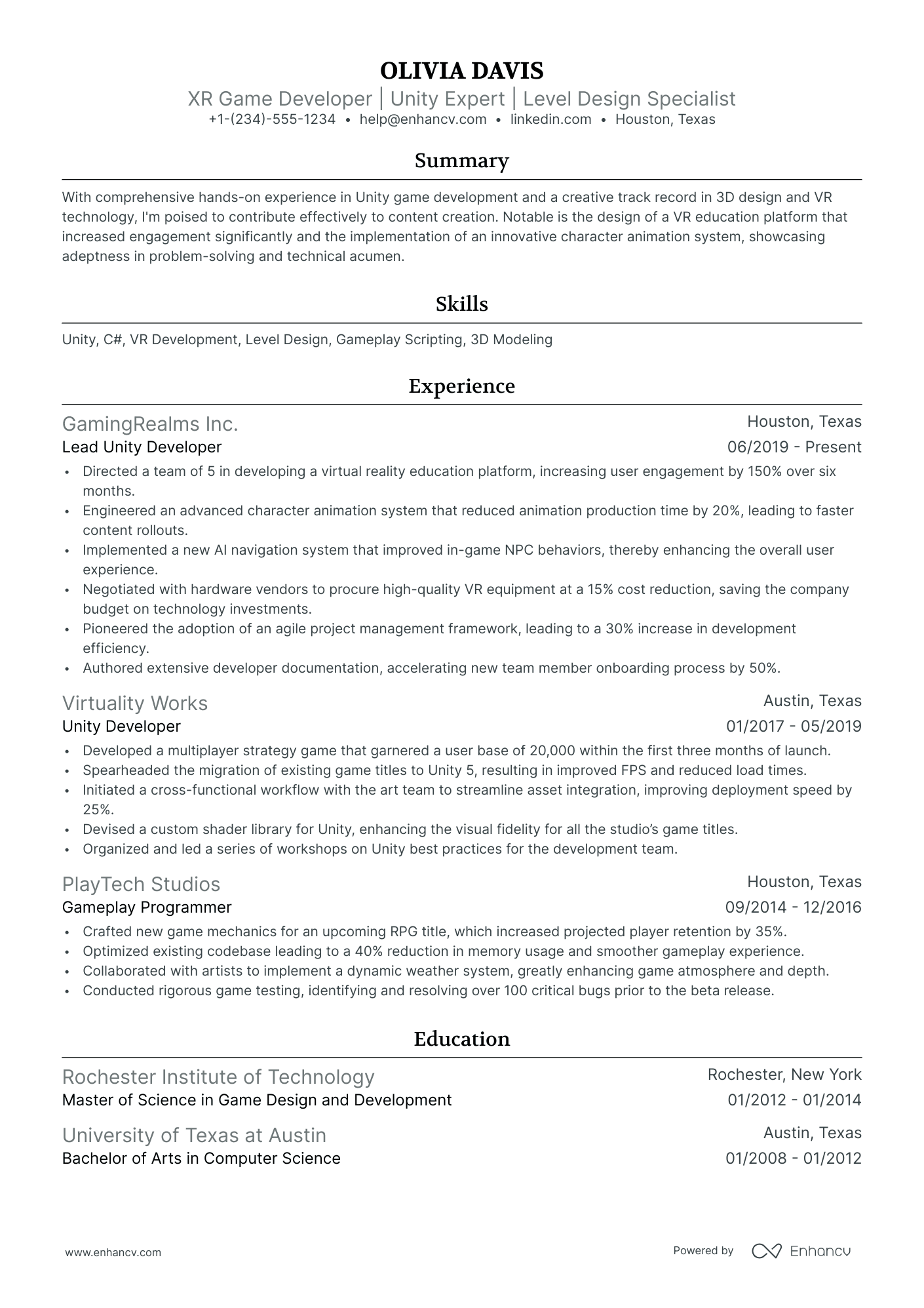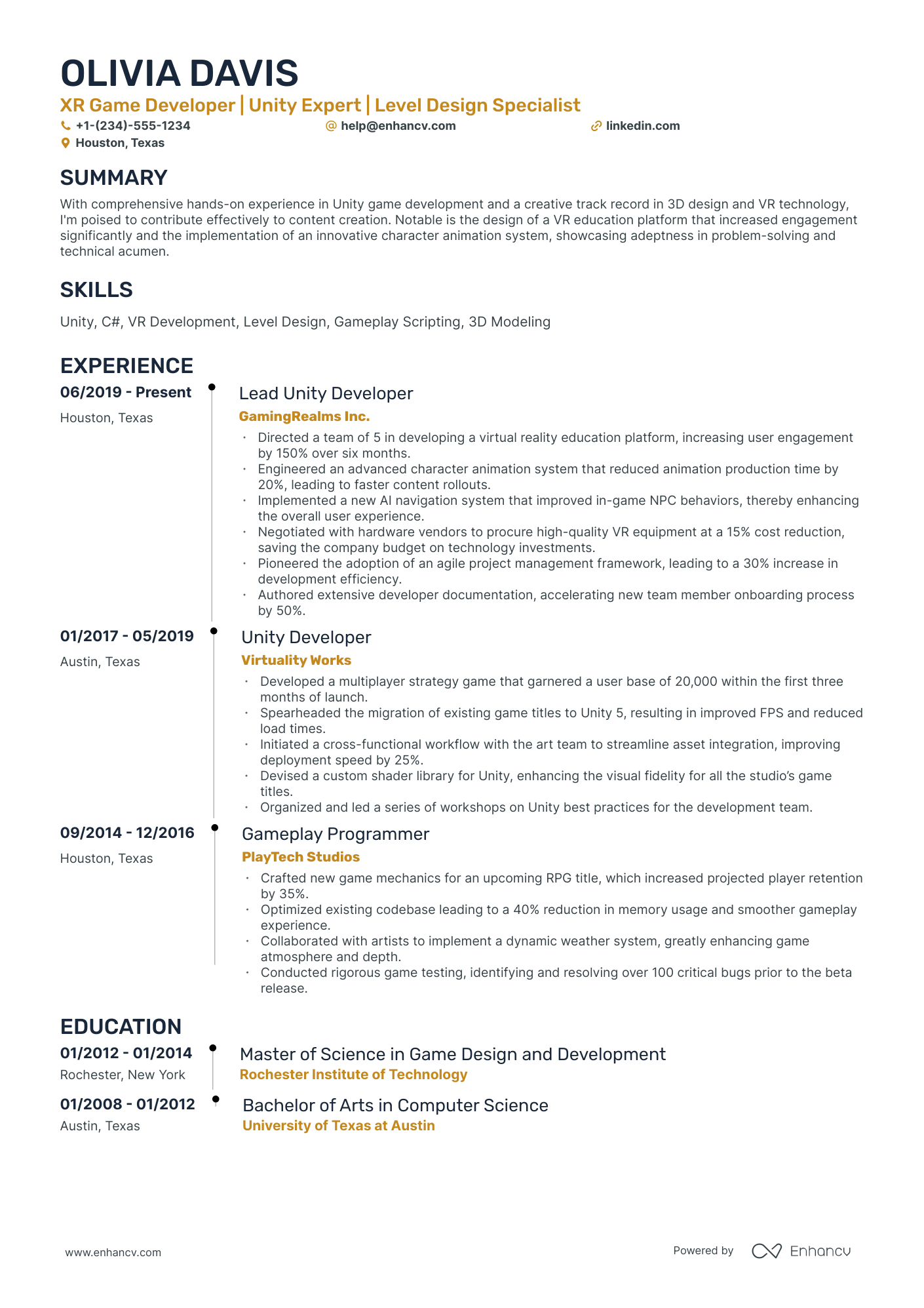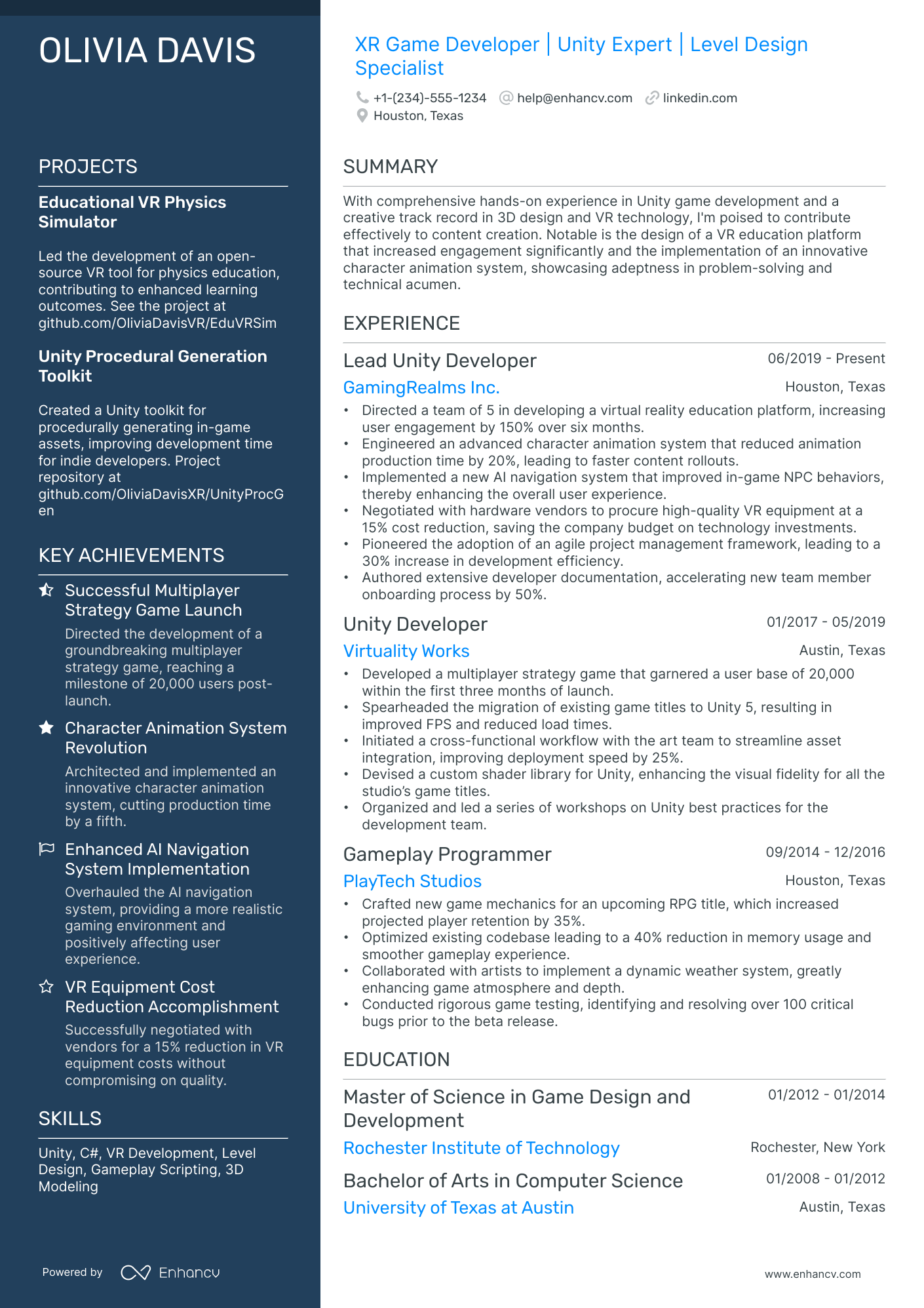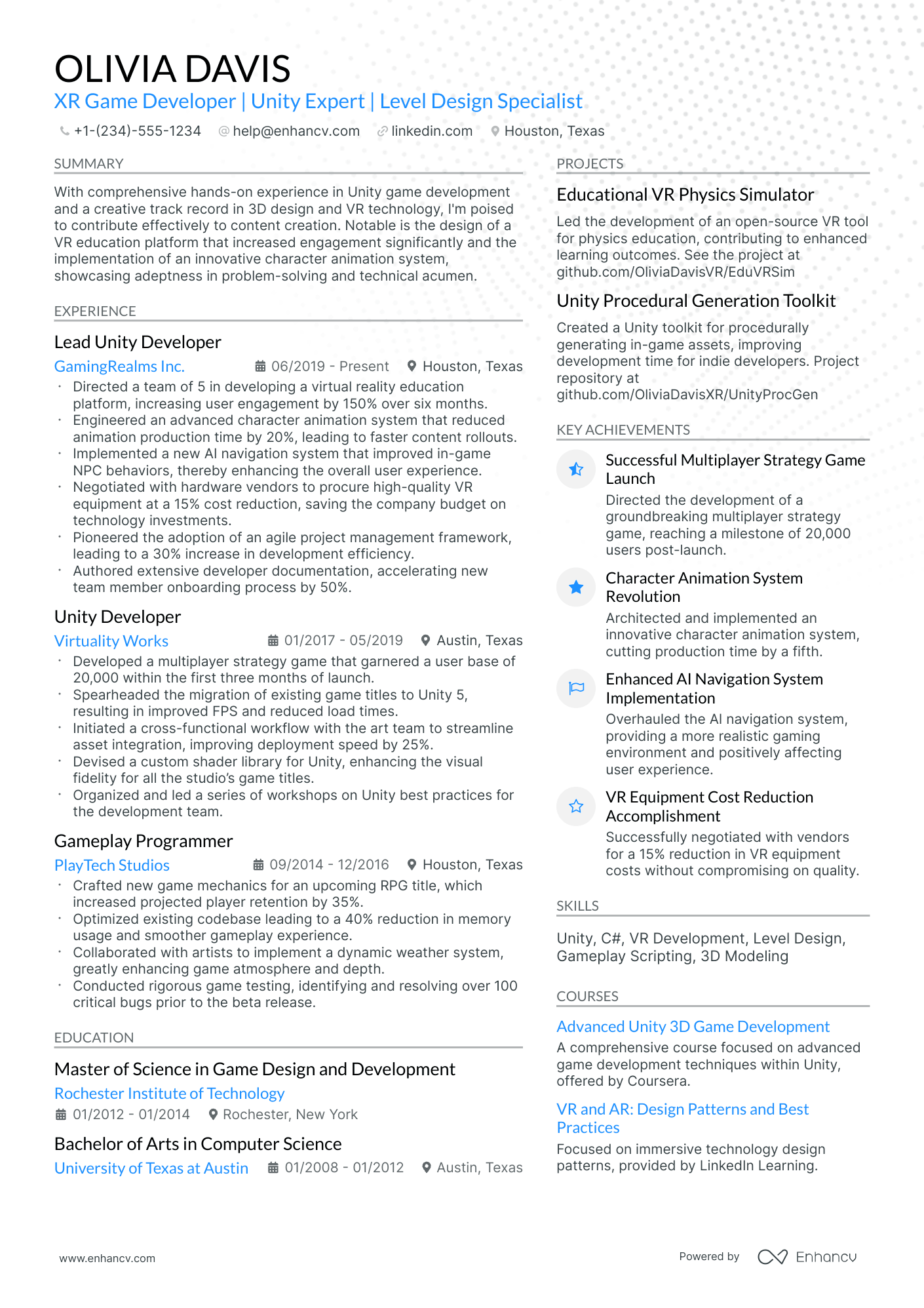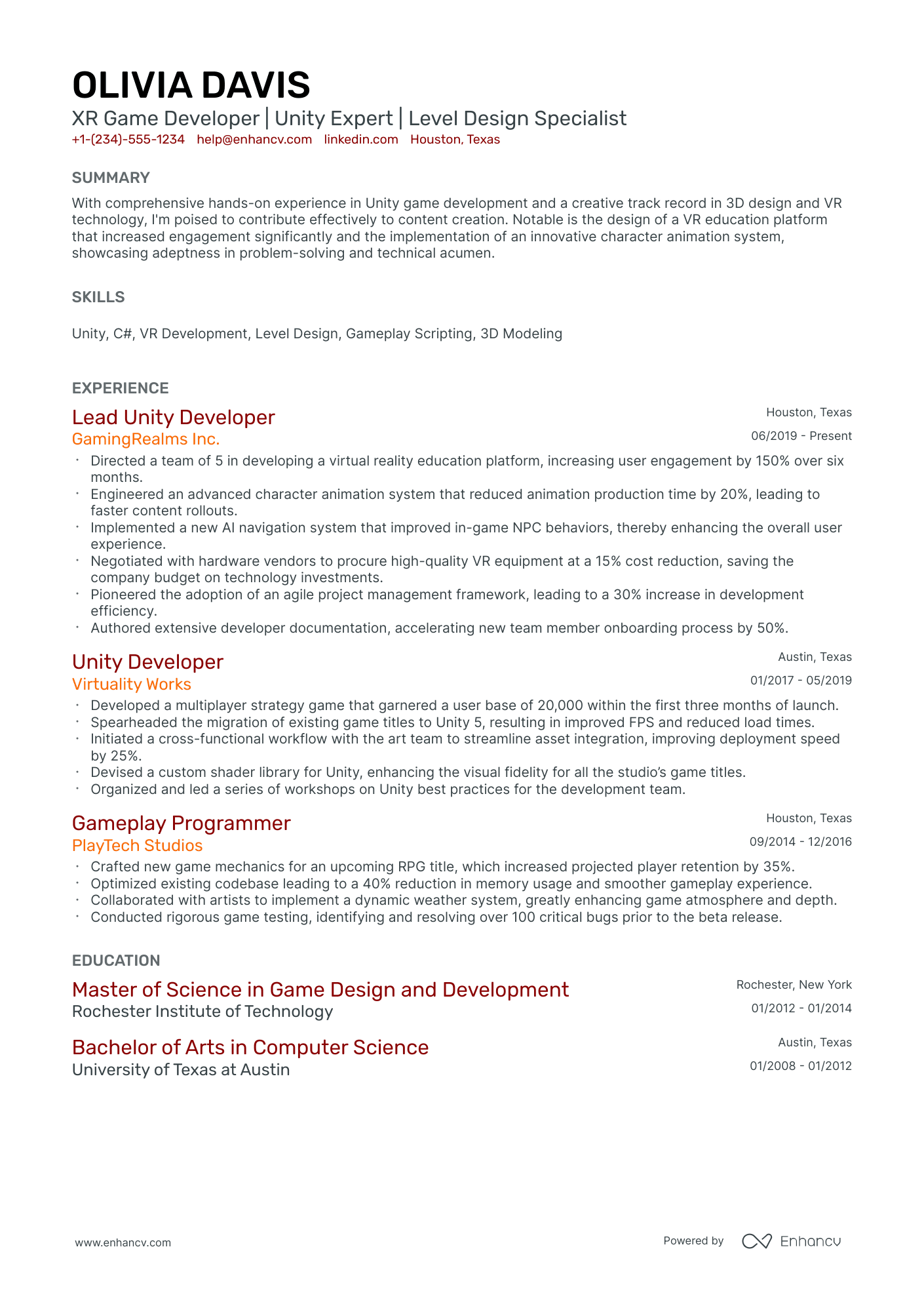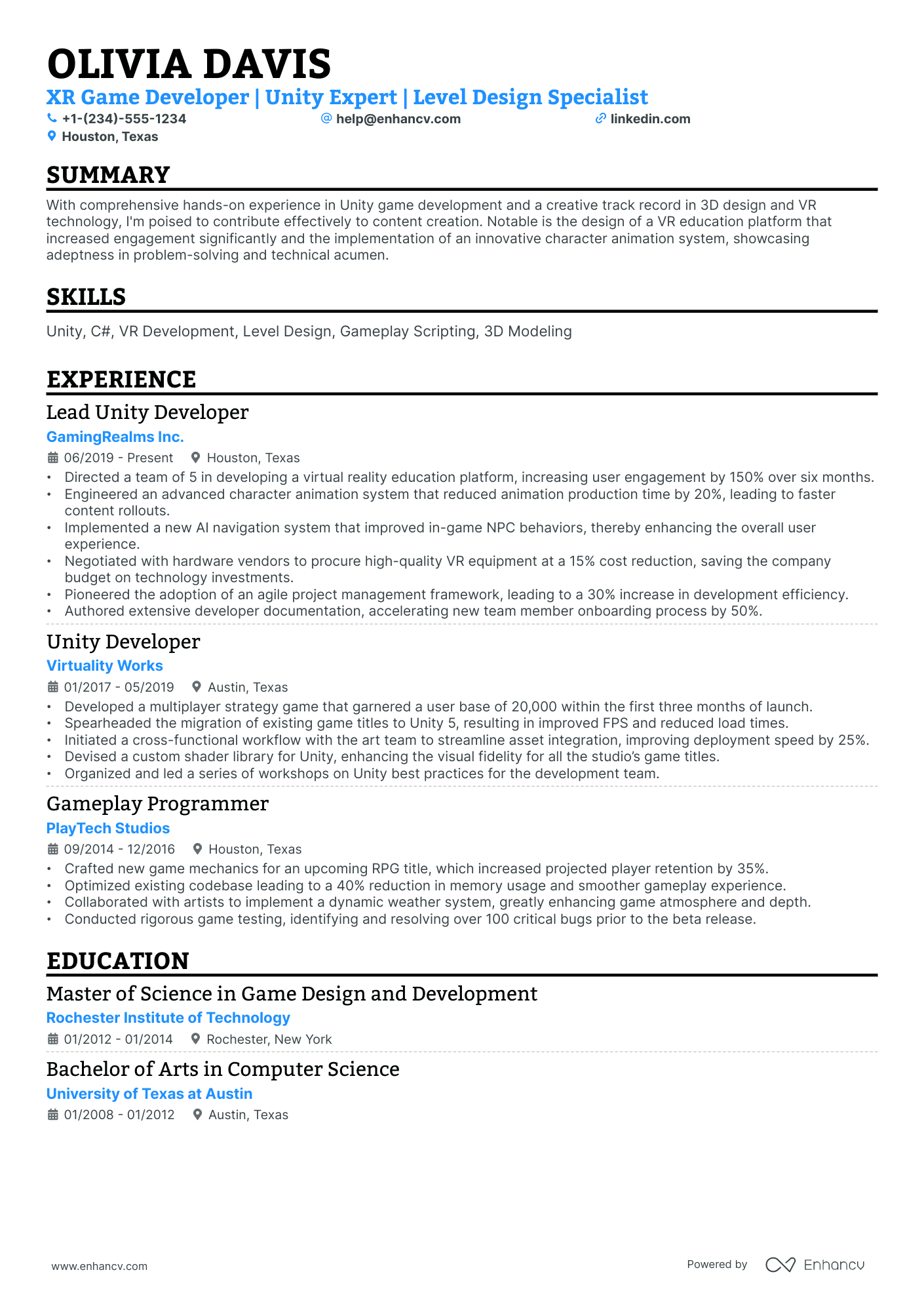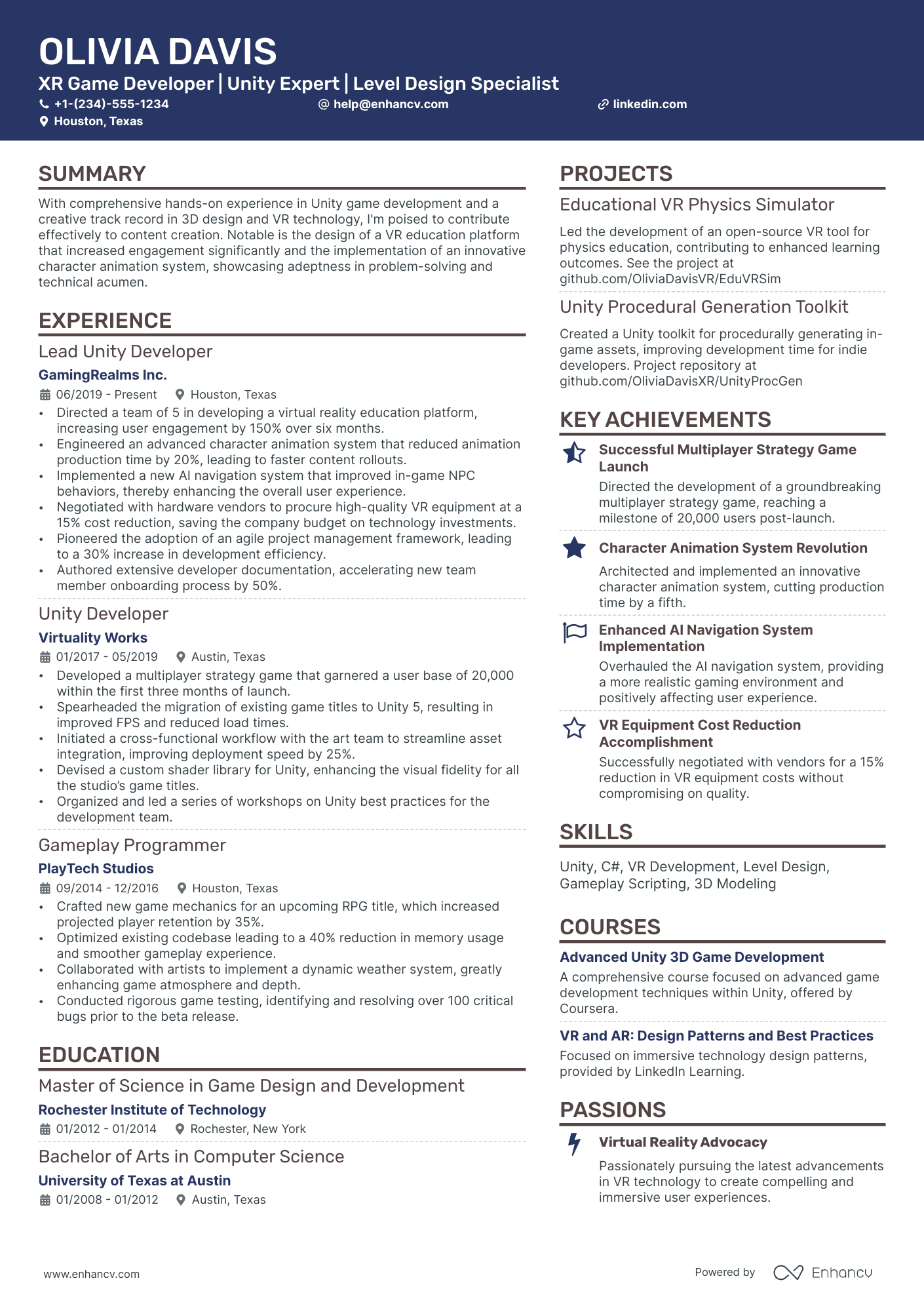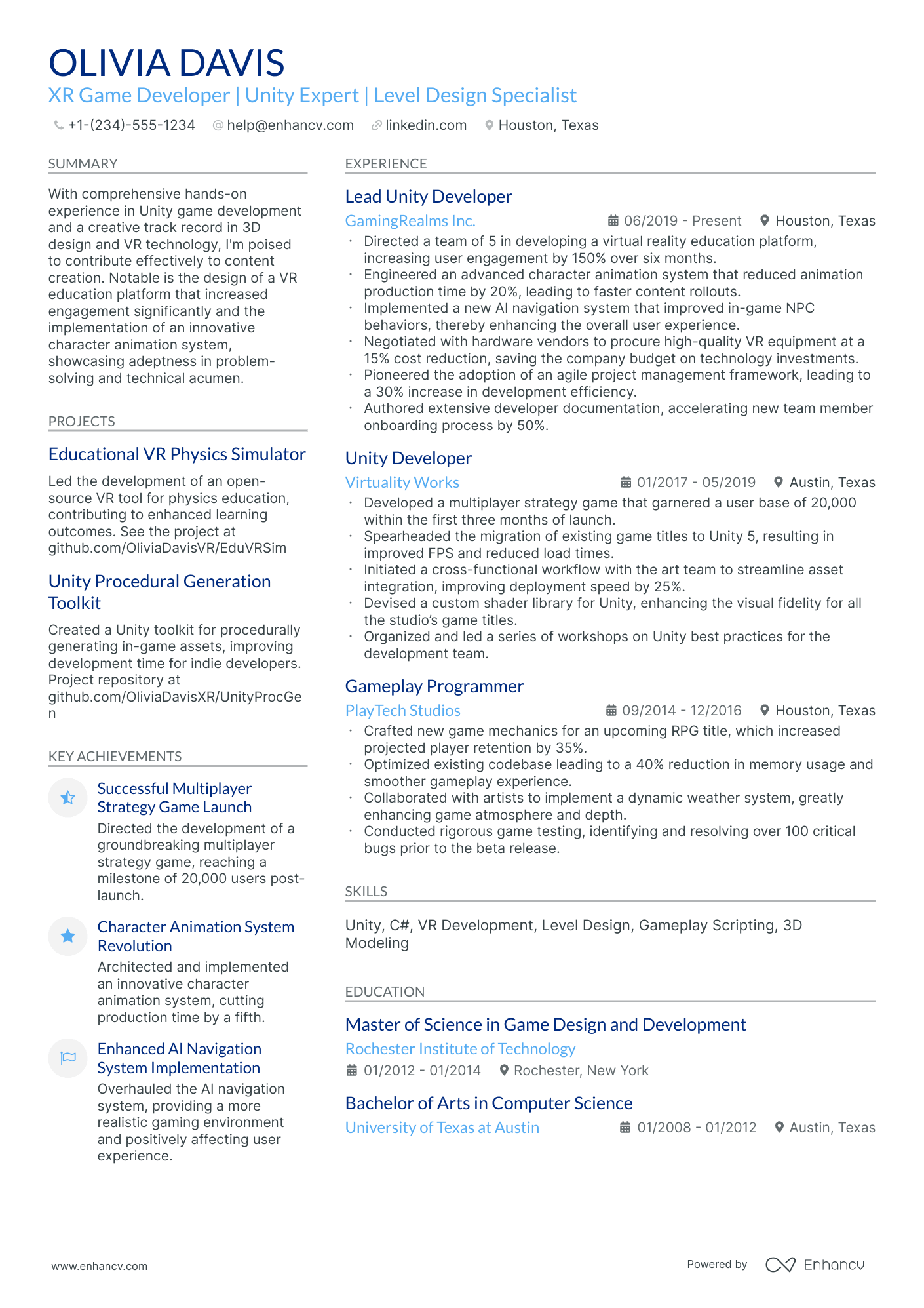One common resume challenge faced by game developers is effectively showcasing both technical proficiencies and creative accomplishments within a concise document. Our guide provides tailored strategies to help you balance and highlight your coding skills and game design achievements, ensuring your resume stands out to potential employers.
- The most effective game developer resume samples, reflecting on experience and skills.
- +10 simple, yet impactful methods to tailor your game developer resume to the job advert.
- Using your professional achievements as the North Star to your unique value as a game developer candidate.
- 'No one cares about your education nowadays …' Let's prove this statement wrong with the best-kept industry secrets to your education and certifications.
If the game developer resume isn't the right one for you, take a look at other related guides we have:
- IT Operations Manager Resume Example
- Wireless Network Engineer Resume Example
- Ccna Network Engineer Resume Example
- Database Developer Resume Example
- ETL Developer Resume Example
- QA Analyst Resume Example
- IT Delivery Manager Resume Example
- Developer Resume Example
- IT Technician Resume Example
- Security Director Resume Example
Tips and tricks for your game developer resume format
Before you start writing your resume, you must first consider its look-and-feel - or resume format . Your professional presentation hence should:
- Follow the reverse-chronological resume format , which incroporates the simple logic of listing your latest experience items first. The reverse-chronological format is the perfect choice for candidates who have plenty of relevant (and recent) experience.
- State your intention from the get-go with a clear and concise headline - making it easy for recruiters to allocate your contact details, check out your portfolio, or discover your latest job title.
- Be precise and simple - your resume should be no more than two pages long, representing your experience and skills that are applicable to the game developer job.
- Ensure your layout is intact by submitting it as a PDF. Thus, your resume sections would stay in place, even when assessed by the Applicant Tracker System (ATS).
Upload & Check Your Resume
Drop your resume here or choose a file. PDF & DOCX only. Max 2MB file size.
PRO TIP
List your educational qualifications and certifications in reverse chronological order.
Fundamental sections for your game developer resume:
- The header with your name (if your degree or certification is impressive, you can add the title as a follow up to your name), contact details, portfolio link, and headline
- The summary or objective aligning your career and resume achievements with the role
- The experience section to curate neatly organized bullets with your tangible at-work-success
- Skills listed through various sections of your resume and within an exclusive sidebar
- The education and certifications for more credibility and industry-wide expertise
What recruiters want to see on your resume:
- Proficiency with game development engines and tools such as Unity, Unreal Engine, or Godot.
- Demonstrable experience with programming languages relevant to game development like C#, C++, or Python.
- Portfolio of completed game projects or contributions to commercially released titles, with details on specific responsibilities and achievements.
- Understanding of the game production process, including experience with project management methodologies like Agile or Scrum.
- Skills in game design principles, with the ability to contribute to gameplay mechanics, story development, and level design.
What to include in the experience section of your game developer resume
The resume experience section is perhaps the most important element in your application as it needs to showcase how your current profile matches the job.
While it may take some time to perfect your game developer experience section, here are five tips to keep in mind when writing yours:
- Assess the advert to make a list of key requirements and look back on how each of your past jobs answers those;
- Don't just showcase you know a particular skill, instead, you need proof in the form of tangible results (e.g. numbers, percent, etc.);
- It's perfectly fine to leave off experience items that don't bring anything extra to your skill set or application;
- Recruiters want to understand what the particular value is of working with you, so instead of solely featuring technologies, think about including at least one bullet that's focused on your soft skills;
- Take care with wording each bullet to demonstrate what you've achieved, using a particular skill, and an action verb.
The below game developer resume examples can help guide you to curate your professional experience, following industry-leading tips and advice.
- Spearheaded a team of 15 developers in the design and implementation of a next-gen RPG for PS5, delivering high-quality code and overseeing the game's architecture, resulting in a 20% increase in studio revenue within 6 months of launch.
- Collaborated with cross-functional teams to create an immersive world that garnered critical acclaim for innovative use of AI, leading to a 40% uptick in user engagement.
- Cultivated a continual learning environment by introducing agile methodologies that reduced time to market by 30% for game features, enhancing company agility and throughput.
- Engineered a robust AI system for an award-winning open-world action game, enhancing NPC behaviors that significantly increased player immersion and satisfaction.
- Optimized game performance across various platforms, achieving a 50% reduction in latency and increasing frame rates to a consistent 60 FPS on consoles.
- Collaborated with the art team to integrate cutting-edge graphics techniques that elevated the visual fidelity of environments and characters, crowning the studio as a leader in visual innovation.
- Developed engaging multiplayer mechanics for a popular FPS series that expanded its gamer base by 200,000 within the first year after release.
- Implemented a series of user feedback loops into the development process, driving a 35% increase in positive reviews due to enhanced user experience and satisfaction.
- Coordinated with the narrative team to integrate storytelling elements that resulted in a 25% longer average playtime by creating deeper player engagement.
- Assisted in the development of a mobile puzzle game that achieved over 1 million downloads in the first month post-launch, establishing the studio as a significant player in mobile gaming.
- Implemented social sharing features which expanded player network by 400%, significantly accelerating user acquisition through organic growth.
- Worked on optimizing code for smooth gameplay across multiple Android and iOS devices, successfully achieving 99.5% crash-free sessions.
- Contributed to the design and development of an indie platformer game that successfully secured funding through a Kickstarter campaign, exceeding the target by 150%.
- Conducted rigorous playtesting sessions resulting in over 300 critical bug fixes before the public release, ensuring a polished gameplay experience.
- Authored original scripts for character dialogues and quest narratives, adding to the game's charm and player retention by creating a more engaging story.
- Crafted an interactive VR simulation experience that saw a surge in use by educational institutions for teaching purposes, leading to a 200% increase in B2B sales.
- Drove innovation by incorporating real-time multiplayer features, allowing for collaborative and competitive gameplay that broadened market reach by entering into the e-sports sector.
- Pioneered in-game analytics tracking to inform design decisions, improving retention rates by tailoring content updates more closely to player behavior patterns.
- Created a suite of automated tools for the Unreal Engine that reduced level design time by 40%, enabling artists and designers to iterate rapidly and efficiently on game maps.
- Developed and maintained a plugin for version control that streamlined resource management among the development team, resulting in a 15% decrease in conflicts and errors.
- Initiated a company-wide tech talk series to share knowledge on best practices and emerging technologies, fostering an environment of innovation and skill development.
- Architected a dynamic event system for a sandbox survival game which allowed for procedurally generated content, keeping the game fresh and increasing monthly active users by 30%.
- Led the integration of a new physics engine that improved the game's realism and physical interactions, resulting in a 20% increase in positive ratings on Steam.
- Orchestrated the transition of the development team to a DevOps culture, which reduced downtime during live game updates and patches by 50%, ensuring a better experience for players.
The following content includes information from "O*NET OnLine" by the U.S. Department of Labor, Employment and Training Administration (USDOL/ETA). Used under the CC BY 4.0 license. The data represents the top responsibilities present on the task lists for game developer professionals.
Top Responsibilities for Game Developer:
- Analyze information to determine, recommend, and plan installation of a new system or modification of an existing system.
- Analyze user needs and software requirements to determine feasibility of design within time and cost constraints.
- Confer with data processing or project managers to obtain information on limitations or capabilities for data processing projects.
- Confer with systems analysts, engineers, programmers and others to design systems and to obtain information on project limitations and capabilities, performance requirements and interfaces.
- Consult with customers or other departments on project status, proposals, or technical issues, such as software system design or maintenance.
- Coordinate installation of software system.
- Design, develop and modify software systems, using scientific analysis and mathematical models to predict and measure outcomes and consequences of design.
- Determine system performance standards.
- Develop or direct software system testing or validation procedures, programming, or documentation.
- Modify existing software to correct errors, adapt it to new hardware, or upgrade interfaces and improve performance.
Quantifying impact on your resume
- Include the number of game projects completed to demonstrate productivity and experience.
- List the percentage of code optimization achieved to show efficiency improvements.
- Mention the amount of revenue generated by the games you developed to highlight your contributions to business success.
- Enumerate the number of bugs identified and resolved to illustrate problem-solving skills and attention to detail.
- Quantify the size of the teams you've collaborated with to demonstrate teamwork and leadership abilities.
- Specify the number of game updates or DLCs you've worked on to show ongoing commitment and ability to maintain engagement.
- State the number of gaming awards won or nominations received to emphasize excellence and industry recognition.
- Report on the percentage increase in user engagement or retention you contributed to provide evidence of creating compelling content.
Action verbs for your game developer resume
Lacking relevant game developer resume experience?
Learn how to write your game developer resume experience in spite of having no real-world (or applicable) experience for the job.
You should:
- Feature relevant projects or publications that could impress recruiters or showcase that you have the basic skill set for the job
- Shift the focus towards your people (communication, organization, etc.) skills to demonstrate that you're a quick learner and can easily adapt to a new environment
- Use the resume objective to not only highlight your accomplishments but also map out how your career plans are perfectly aligned with the company's vision
- Select either the functional-skill-based resume format (that puts the focus on your skills) or the hybrid one (balancing expertise with skills).
Recommended reads:
PRO TIP
List your educational qualifications and certifications in reverse chronological order.
How to showcase hard skills and soft skills on your resume
Reading between the lines of your dream job, you find recruiters are looking for candidates who have specific software or hardware knowledge, and personal skills.
Any technology you're adept at shows your hard skills. This particular skill set answers initial job requirements, hinting at how much time your potential employers would have to invest in training you. Showcase you have the relevant technical background in your communicate, solve problems, and adapt to new environments. Basically, your interpersonal communication skills that show recruiters if you'd fit into the team and company culture. You could use the achievements section to tie in your greatest wins with relevant soft skills.
It's also a good idea to add some of your hard and soft skills across different resume sections (e.g. summary/objective, experience, etc.) to match the job requirements and pass the initial screening process. Remember to always check your skill spelling and ensure that you've copy-pasted the name of the desired skills from the job advert as is.
Top skills for your game developer resume:
C#
Unity
Unreal Engine
JavaScript
Python
3D Modeling
Game Design
Version Control (Git)
Shader Programming
AI Programming
Problem-Solving
Team Collaboration
Creativity
Communication
Time Management
Adaptability
Attention to Detail
Critical Thinking
Project Management
Passion for Gaming
Next, you will find information on the top technologies for game developer professonals from "O*NET OnLine" by the U.S. Department of Labor, Employment and Training Administration (USDOL/ETA). Used under the CC BY 4.0 license.
Top technologies for Game Developer’s resume:
- Oracle Java 2 Platform Enterprise Edition J2EE
- Oracle SQL Developer
- Blackboard software
- GraphQL
- Apache Spark
- TypeScript
PRO TIP
Mention specific courses or projects that are pertinent to the job you're applying for.
Certifications and education: in-demand sections for your game developer resume
Your academic background in the form of certifications on your resume and your higher degree education is important to your application.
The certifications and education sections pinpoint a variety of hard and soft skills you possess, as well as your dedication to the industry.
Add relevant certificates to your game developer resume by:
- Add special achievements or recognitions you've received during your education or certification, only if they're really noteworthy and/or applicable to the role
- Be concise - don't list every and any certificate you've obtained through your career, but instead, select the ones that would be most impressive to the role
- Include the name of the certificate or degree, institution, graduation dates, and certificate license numbers (if possible)
- Organize your education in reverse chronological format, starting with the latest degree you have that's most applicable for the role
Think of the education and certification sections as the further credibility your game developer resume needs to pinpoint your success.
Now, if you're stuck on these resume sections, we've curated a list of the most popular technical certificates across the industry.
Have a look, below:
The top 5 certifications for your game developer resume:
- Unity Certified Programmer - UCP (Unity Technologies)
- Unity Certified 3D Artist - UCA (Unity Technologies)
- Adobe Certified Expert - ACE (Adobe)
- Certified ScrumMaster - CSM (Scrum Alliance)
- Microsoft Certified: Azure Fundamentals - AZ-900 (Microsoft)
The content below includes information from "O*NET OnLine" by the U.S. Department of Labor, Employment and Training Administration (USDOL/ETA). Used under the CC BY 4.0 license. The data represents the top associations for game developer professionals.
Top US associations for a Game Developer professional
- Association for Computing Machinery
- Association for Information Science and Technology
- Association for Information Systems
- Association for the Advancement of Artificial Intelligence
- Association for Women in Computing
PRO TIP
If you're in the process of obtaining your certificate or degree, list the expected date you're supposed to graduate or be certified.
Recommended reads:
The game developer resume summary or objective: integrating keywords, achievements, and more
Deciding whether to include a resume summary or an objective in your game developer resume is crucial. Both serve as key introductory elements at the top of your resume, encapsulating your profile in up to five sentences and incorporating relevant keywords from the job advert.
Here are the key differences between the two:
- The resume summary focuses on aligning your achievements and experience with the job requirements. It provides recruiters with a snapshot of your expertise, helping you stand out as an ideal candidate for the role.
- The resume objective, on the other hand, centers on your career goals and aspirations, detailing how the role aligns with your career progression. It's particularly suitable for candidates with less professional experience or those new to the job market.
Below are examples demonstrating best practices in utilizing the resume summary and/or objective to make a strong first impression with your game developer resume.
Resume summaries for a game developer job
- With over 6 years of professional experience in AAA game development, I have a proven track record in Unreal Engine 4, C++ proficiency, and have led the production of a top-charting mobile game. My leadership in cross-functional teams has significantly contributed to enhancing user engagement and retention metrics.
- Distinguished software engineer with 8 years of experience in developing robust code for high-volume businesses. Now seeking to leverage extensive background in AI and machine learning to create immersive and dynamic game environments for a leading game studio.
- Seasoned professional in graphic design with a decade of creating compelling visual content for brands, I am now transitioning my creative direction to the realm of video game artistry. Proficient in 3D modeling and animation, I aspire to craft memorable game aesthetics that resonate with diverse audiences.
- Former military strategist with an acute understanding of team leadership and tactical planning, I am pivoting my expertise toward building engaging, strategic game worlds. My experience in high-pressure environments primes me for the dynamic challenges in developing an enthralling gaming experience.
- As a recent Computer Science graduate with top honors and a passion for game development, I aim to apply my knowledge of Unity and C# in a real-world setting to create engaging and innovative games. My academic success, including a capstone project in game design, showcases my enthusiasm and potential in this field.
- Armed with a fresh Bachelor's degree in Interactive Media and a portfolio of self-made indie games, I am eager to grow professionally in a game development environment. I am determined to convert my proficiency in game mechanics and VR experiences into captivating games that push the boundaries of player engagement.
Average salary info by state in the US for Game Developer professionals
Local salary info for Game Developer.” Source: My Next Move, National Center for O*NET Development. Accessed 10/15/2024
| State | Average Salary (in USD) |
|---|---|
| US National Average | $132,270 |
| California (CA) | $168,660 |
| Texas (TX) | $127,000 |
| Florida (FL) | $122,310 |
| New York (NY) | $145,470 |
| Pennsylvania (PA) | $111,910 |
| Illinois (IL) | $126,200 |
| Ohio (OH) | $107,560 |
| Georgia (GA) | $127,070 |
| North Carolina (NC) | $130,620 |
| Michigan (MI) | $103,830 |
Bonus sections for your game developer resume
Looking to show more personality on your game developer resume? Then consider including a couple of extra sections.
They'd benefit your application by highlighting your most prominent:
Key takeaways
- All aspects of your resume should be selected to support your bid for being the perfect candidate for the role;
- Be intentional about listing your skill set to be balanced with both technical and people capabilities, while aligning with the job;
- Include any experience items that are relevant to the role and ensure you feature the outcomes of your responsibilities;
- Use the summary or objective as a screenshot of your best experience highlights;
- Curate various resume sections to showcase personal, transferable skills.
